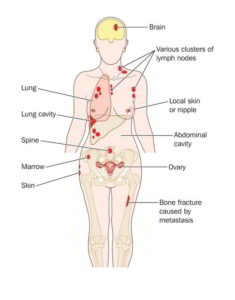The triplet of Opdivo, Cyramza and Paclitaxel showed promising antitumor activity with durable responses in a phase II study of patients with advanced gastric cancer.
The impact of PD-L1 expression on the clinical outcome for this combination is not clear.
Study rational
Opdivo has already shown a significant survival benefit in patients with advanced gastric cancer,while Cyramza demonstrated enhanced survival in combination with Paclitaxel as second-line treatment. Thus, the combination seems rational.
About the study
The phase I/II study tested the effect of the triplet in 43 advanced gastric cancer patients who failed Platinum and Fluoropyrimidine doublet chemotherapy and their disease had progressed.
Results
- 37.2% of patients had their cancer shrunk
- Another 46.5% had their cancer stopped from further growing
- And so a total of 83.7% of patient responded to the triple combination.
- At almost 2 years, 46.5% of patients had their disease progressed.
- The median survival was 13.1 months
- At one year from the start of the triple treatment 55.8% of patients were alive and at two years, 32.1%.
The best treatment for a cancer patient is to get the most advanced cancer drugs in advanced stages of development. There, the hope and the chance to extend life go far beyond the standard protocols.
Contact us to find out what is the best treatment for YOU
TRIAL•IN Pharma
Do not give up on life!
Contact us 24/7 for free service matching:
Call center +44.2082.426.039
About Gastric Cancer
Gastric cancer, also called “Stomach cancer”, starts when some of the cells constituting the inner part of the stomach start growing and proliferating without control. This abnormal growth creates a tumor that is cancerous. Usually gastric cancer grows slowly, along a course of many years.
Cause of Gastric Cancer
At the present it is still unknown why some people contract the disease, while others don’t. However, it is known that bacteria, named “H. pylori” may increase the chance of contracting stomach cancer, as well as a stomach inflammation known as “Gastritis”, long term anemia known as “Pernicious anemia” and the formation of polyps in the stomach.
Symptoms
- Indigestion
- Feeling swollen after eating
- Heartburn
- Mild nausea
- Loss of appetite
Clinical trials for gastric cancer
Facts
The existing therapies used on stage 4 metastatic gastric cancer are not curative, and this is a source to the need for innovative and effective treatment strategies in order to fight the disease.
The National Cancer Institute, NCI, highlights the fact that for a certain group of gastric cancer patients, the best treatment option is to join one of the many clinical trials existing worldwide aiming to increase their chances of therapeutic success.
Currently, every patient will be offered the standard protocols described above. Sometimes the oncologist may suggest integrating these therapies with trials carried out in the institute.
The opportunity
Advances in cancer therapies may be found in clinical trials prescribing cutting edge, innovative drugs, some of which have already been recognized by the US Food & Drug Administration, the FDA, as “breakthrough drugs” and require further information to be approved.
An entire world of clinical trials, Compassionate drugs and advanced new cancer treatments are available worldwide.
It is important to know and have access to cutting edge cancer treatments that best match the unique medical condition of the patient and increase chances in winning the fight against compared to the standard care offered.
Note to remember!
Not every patient is eligible to enter a specific clinical trial. The eligibility conditions must be fully met and each case is reviewed separately to ensure that the clinical trial matches to the specific cancer patient and vice versa.
#cancer



















